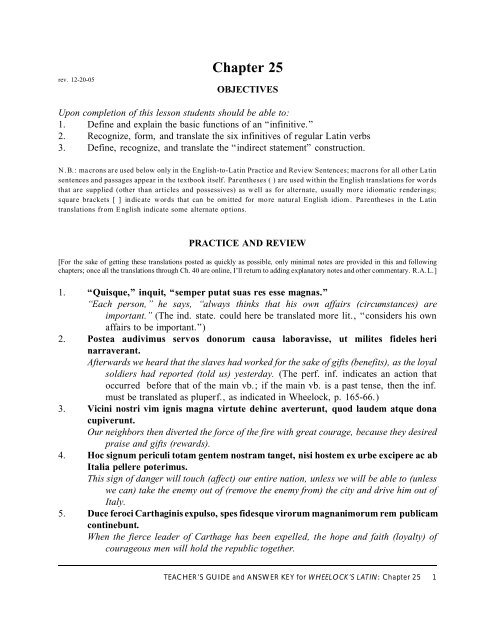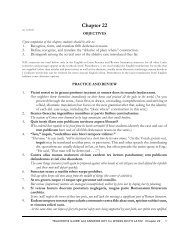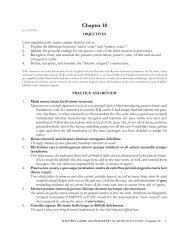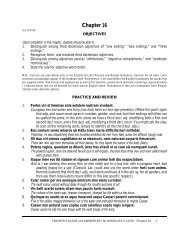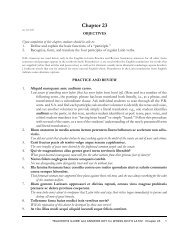Chapter 25
Chapter 25
Chapter 25
Create successful ePaper yourself
Turn your PDF publications into a flip-book with our unique Google optimized e-Paper software.
ev. 12-20-05<br />
<strong>Chapter</strong> <strong>25</strong><br />
OBJECTIVES<br />
Upon completion of this lesson students should be able to:<br />
1. Define and explain the basic functions of an “infinitive.”<br />
2. Recognize, form, and translate the six infinitives of regular Latin verbs<br />
3. Define, recognize, and translate the “indirect statement” construction.<br />
N.B.: macrons are used below only in the English-to-Latin Practice and Review Sentences; macrons for all other Latin<br />
sentences and passages appear in the textbook itself. Parentheses ( ) are used within the English translations for words<br />
that are supplied (other than articles and possessives) as well as for alternate, usually more idiomatic renderings;<br />
square brackets [ ] indicate words that can be omitted for more natural English idiom. Parentheses in the Latin<br />
translations from English indicate some alternate options.<br />
PRACTICE AND REVIEW<br />
[For the sake of getting these translations posted as quickly as possible, only minimal notes are provided in this and following<br />
chapters; once all the translations through Ch. 40 are online, I’ll return to adding explanatory notes and other commentary. R.A.L.]<br />
1. “Quisque,” inquit, “semper putat suas res esse magnas.”<br />
“Each person,” he says, “always thinks that his own affairs (circumstances) are<br />
important.” (The ind. state. could here be translated more lit., “considers his own<br />
affairs to be important.”)<br />
2. Postea audivimus servos donorum causa laboravisse, ut milites fideles heri<br />
narraverant.<br />
Afterwards we heard that the slaves had worked for the sake of gifts (benefits), as the loyal<br />
soldiers had reported (told us) yesterday. (The perf. inf. indicates an action that<br />
occurred before that of the main vb.; if the main vb. is a past tense, then the inf.<br />
must be translated as pluperf., as indicated in Wheelock, p. 165-66.)<br />
3. Vicini nostri vim ignis magna virtute dehinc averterunt, quod laudem atque dona<br />
cupiverunt.<br />
Our neighbors then diverted the force of the fire with great courage, because they desired<br />
praise and gifts (rewards).<br />
4. Hoc signum periculi totam gentem nostram tanget, nisi hostem ex urbe excipere ac ab<br />
Italia pellere poterimus.<br />
This sign of danger will touch (affect) our entire nation, unless we will be able to (unless<br />
we can) take the enemy out of (remove the enemy from) the city and drive him out of<br />
Italy.<br />
5. Duce feroci Carthaginis expulso, spes fidesque virorum magnanimorum rem publicam<br />
continebunt.<br />
When the fierce leader of Carthage has been expelled, the hope and faith (loyalty) of<br />
courageous men will hold the republic together.<br />
TEACHER’S GUIDE and ANSWER KEY for WHEELOCK’S LATIN: <strong>Chapter</strong> <strong>25</strong> 1
6. Cur iucundus Horatius culpas humanas in saturis semper ostendebat atque ridebat?<br />
Why was the pleasant Horace constantly pointing out and laughing at (ridiculing) human<br />
faults in his satires?<br />
7. Credimus fidem antiquam omnibus gentibus iterum alendam esse.<br />
We believe that ancient faith (the trustworthiness/loyalty of earlier times) should again be<br />
fostered by all nations. (Use of the pass. periphrastic inf. was common in ind. state.)<br />
8. Dux, ad senatum missus, imperium accepit et imperator factus est.<br />
The leader, having been (when he had been) dispatched to the Senate, received the power<br />
(military command) and was made (appointed) general.<br />
9. Res publica, ut ait, libellis huius modi tolli potest.<br />
The Republic, as he says, can be destroyed by little volumes (pamphlets) of this sort.<br />
(Political pamphleteering was common in ancient Rome; cf. Eng. “libel.”)<br />
10. Aliqui negant hostes victos servitute umquam opprimendos esse.<br />
Some men say that the conquered enemy should never be oppressed by slavery. (Hostis<br />
was often used in the pl. to refer to “the enemy” in a collective sense.)<br />
11. Credunt magistram sapientem veritatem patefacturam esse.<br />
They believe that the wise teacher will reveal the truth.<br />
12. Quisquis veritatem recipiet bene educabitur.<br />
Whoever shall receive (embrace) the truth will be well educated.<br />
13. We thought that your sisters were writing the letter.<br />
Put�vimus (c�git�vimus) sor�r�s (tu�s/vestr�s) litter�s scr�bere. (This and the three<br />
following Eng.-to-Lat. sents., each using a form of scr�b�, provide simple practice<br />
with each of the three inf. tenses.)<br />
14. They will show that the letter was written by the brave slavegirl.<br />
Ostendent (d�m�nstr�bunt) litter�s � serv� fort� scr�pt�s esse.<br />
15. He said that the letter had never been written.<br />
D�xit litter�s numquam scr�pt�s esse.<br />
16. We hope that the judge’s wife will write those two letters tomorrow.<br />
Sp�r�mus ux�rem i�dicis ill�s du�s litter�s cr�s scr�pt�ram esse.<br />
SENTENTIAE ANTIQUAE<br />
1. Id factum esse tum non negavit.<br />
He did not then deny that it (this) had been done.<br />
2. His rebus pronuntiatis, igitur, eum esse hostem scivisti.<br />
When these things had been announced, therefore, you knew that he was an enemy.<br />
3. Eum ab hostibus exspectari nunc sentis.<br />
You now feel (you are now aware) that he is being looked for (is expected) by the enemy.<br />
4. Vidi eos in urbe remansisse et nobiscum esse.<br />
I saw that they had remained in the city and were with us.<br />
5. Itaque aeternum bellum cum malis civibus a me susceptum esse cerno.<br />
And so I perceive (am aware) that an eternal war with evil citizens has been undertaken<br />
2 TEACHER’S GUIDE and ANSWER KEY for WHEELOCK’S LATIN: <strong>Chapter</strong> <strong>25</strong>
y me.<br />
6. Idem credo tibi faciendum esse.<br />
I believe that the same thing must be done by you (that you should do the same thing).<br />
7. Te enim esse fidelem mihi sciebam.<br />
For I knew that you were loyal to me.<br />
8. Hostibus se in civitatem vertentibus, senatus Cincinnato nuntiavit eum factum esse<br />
dictatorem.<br />
With the enemy turning [themselves] against the state, the Senate announced to<br />
Cincinnatus that he had been made dictator.<br />
9. Dico te, Pyrrhe, Romanos posse vincere.<br />
I say, Pyrrhus, that you are able to defeat the Romans.<br />
10. Dic, hospes, Spartae te nos hic iacentes vidisse, patriae fideles.<br />
Say to (tell) Sparta, stranger, that you saw us lying here, loyal to our fatherland.<br />
11. Socrates putabat se esse civem totius mundi.<br />
Socrates used to suppose that he was (considered himself to be) a citizen of the whole<br />
world.<br />
12. Illi magistri negant quemquam virum esse bonum nisi sapientem.<br />
Those teachers say (assert) that not any man (no man) is good unless he is wise (except<br />
the wise man). (A tenet of ancient Stoicism: only the wise man can be truly virtuous.)<br />
13. Negavi, autem, mortem timendam esse.<br />
I have said, however, that death must not be feared (I denied, moreover, that death was<br />
to be feared).<br />
14. Credo deos immortales sparsisse spiritus in corpora humana.<br />
I believe that the immortal gods have scattered souls into human bodies.<br />
15. Adulescens sperat se diu victurum esse; senex potest dicere se diu vixisse.<br />
A young man hopes that he will live for a long time; an old man can say that he has lived<br />
for a long time.<br />
16. Aiunt enim multum legendum esse, non multa.<br />
For they say that much must be read, not many things. (I.e., one ought to read, not a lot<br />
of books, but important books.)<br />
THE DEATH OF LAOCOON . . . AND TROY<br />
Hic alius magnus timor (O fabula misera!) animos caecos nostros terret. Laocoon,<br />
sacerdos Neptuni fortuna factus, acrem taurum ad aram in litore mactabat. Tum gemini<br />
serpentes potentes, mare prementes, ab insula ad litora currunt. Iamque agros tenebant et,<br />
oculis igne ardentibus, ora linguis sibilis lambebant.<br />
Nos omnes fugimus; illi via certa Laocoonta filiosque eius petunt. Primum parva<br />
corpora duorum puerorum capiunt et lacerant necantque devorantque. Tum patrem fortem,<br />
ad filios miseros currentem, rapiunt et magnis spiris tenent et superant. Nec se a vulneribus<br />
defendere nec fugere potest, et ipse, ut taurus saucius ad aram, clamores horrendos ad<br />
caelum tollit. Eodem tempore serpentes fugiunt, petuntque perfugium in arce Minervae acris.<br />
TEACHER’S GUIDE and ANSWER KEY for WHEELOCK’S LATIN: <strong>Chapter</strong> <strong>25</strong> 3
Quod Laocoon in equum Minervae hastam iecerat, nos putavimus eum erravisse et<br />
poenas dedisse; veritatem acerbam nescivimus. Portas patefacimus et admittimus istum<br />
equum in urbem; atque pueri puellaeque—O patria, O di magni, O Troia!—eum tangere<br />
gaudent. Et quoque gaudemus nos miseri, quibus ille dies fuit ultimus ac quibus numquam<br />
erit ullum solacium.<br />
Here another great fear (oh pitiable tale!) terrifies our blind (unseeing/unsuspecting)<br />
hearts. Laocoon, [having been] made priest of Neptune by fortune (fate), was sacrificing a fierce<br />
bull at an altar on the shore. Then, powerful twin serpents, pressing on the sea, rush from the<br />
island toward the shore. And already they were taking hold of the fields, and, their eyes burning<br />
with fire, they were licking their mouths with hissing tongues.<br />
We all (all of us) flee; those (serpents) aim at Laocoon and his sons by (on) a determined<br />
course. First, they seize the small bodies of the two boys, and they tear at, and slay, and devour<br />
(them). Then, they seize the courageous father, running (as he rushes) to his poor sons, and they<br />
hold him with their gigantic coils and overpower him. He is able neither to defend himself from<br />
the wounds, nor to escape; and he himself, just as a bull wounded (like the wounded bull) at the<br />
altar, raises up terrible screams to heaven. At the same time, the serpents rush away, and they<br />
seek refuge in the citadel of savage Minerva.<br />
Because Laocoon had hurled his spear into Minerva’s horse, we thought that he had erred<br />
and paid the penalty; we did not know the bitter truth. We open up the gates and admit that<br />
(terrible) horse into our city; and the boys and girls– oh fatherland, oh great gods, oh<br />
Troy!– rejoice to touch it. And we too rejoice, wretched ones, for whom that day was the last and<br />
for whom there will never be any comfort. (Ask students to answer the comprehension questions<br />
on this passage in the Lectiones B section of the Workbook; remember that an answer key to the<br />
Workbook is available to instructors online at www.harperacademic.com.)<br />
4 TEACHER’S GUIDE and ANSWER KEY for WHEELOCK’S LATIN: <strong>Chapter</strong> <strong>25</strong>


